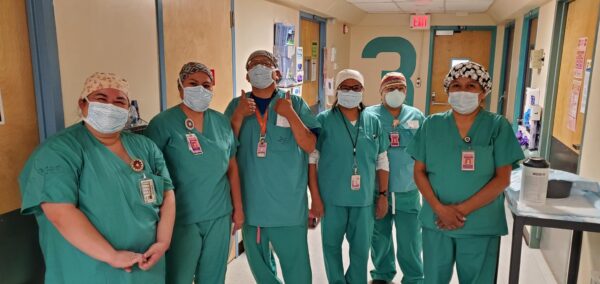
- Details
- By Native News Online Staff
3,802 recoveries, 69 new cases, and 11 more deaths related to COVID-19 reported as health care experts warn against consuming hand sanitizer
WINDOW ROCK, Ariz. — On Wednesday, the Navajo Department of Health, in coordination with the Navajo Epidemiology Center and the Navajo Area Indian Health Service, reported 69 new COVID-19 positive cases for the Navajo Nation and 11 more deaths. The total number of deaths is 347 as of Wednesday. Reports from 11 health care facilities on and near the Navajo Nation indicate that 3,802 individuals have recovered from COVID-19, with one health care facility report still pending. 51,144 people have been tested for COVID-19. The total number of COVID-19 positive cases for the Navajo Nation is 7,157.
Navajo Nation COVID-19 positive cases by Service Unit:
- Chinle Service Unit: 1,859
- Crownpoint Service Unit: 648
- Ft. Defiance Service Unit: 432
- Gallup Service Unit: 1,215
- Kayenta Service Unit: 1,034
- Shiprock Service Unit: 1,158
- Tuba City Service Unit: 588
- Winslow Service Unit: 215
* Eight residences with COVID-19 positive cases are not specific enough to place them accurately in a Service Unit.
The Navajo Nation's public health emergency orders, including requiring the use of protective masks in public and the daily curfews from 8:00 p.m. to 5:00 a.m., are still in effect throughout the Navajo Nation.
"Our young people need to remember that this virus can affect anyone, not only our elders. Please think of our elders and those with underlying conditions before you travel or go into public. There’s no need to go into a store for a bag of chips or bottle of soda and put yourself and others at risk of COVID-19. This virus is showing that it can and will infect anyone of any age and it is proving to be fatal across all ages. Let’s be diligent and stay home as much as possible and please keep praying for our Nation," said Navajo Nation President Jonathan Nez.
Health care experts are reporting cases of people drinking hand sanitizer, which has led to hospital visits and several are currently in critical condition. Swallowing alcohol-based hand sanitizers can cause alcohol poisoning. Hand sanitizer should be stored out of reach of children and should be used with adult supervision. Do not use hand sanitizers that contain methanol. Substantial methanol exposure can result in nausea, vomiting, headache, blurred vision, permanent blindness, seizures, coma, permanent damage to the nervous system, or death.
To Donate to the Navajo Nation
The official webpage for donations to the Navajo Nation, which has further details on how to support the Nation’s Dikos Ntsaaígíí-19 (COVID-19) efforts is: http://www.nndoh.org/donate.html.
For More Information
For more information including reports, helpful prevention tips, and more resources, please visit the Navajo Department of Health’s COVID-19 website at http://www.ndoh.navajo-nsn.
For up to date information on impact the coronavirus pandemic is having in the United States and around the world go to: https://www.worldometers.info/coronavirus/country/us/?fbclid=IwAR1vxfcHfMBnmTFm6hBICQcdbV5aRnMimeP3hVYHdlxJtFWdKF80VV8iHgE
For up-to-date information about COVID-19, Native News Online encourages you to go to Indian Health Service’s COVID-19 webpage and review CDC’s COVID-19 webpage.
More Stories Like This
Native News Weekly (August 25, 2024): D.C. BriefsDeb Haaland Rolls Out Affordability Agenda in Albuquerque
Boys & Girls Clubs and BIE MOU Signing at National Days of Advocacy
National Congress of American Indians Mourns the Passing of Former Executive Director JoAnn K. Chase
Navajo Nation Mourns the Passing of Former Vice President Rex Lee Jim
Help us defend tribal sovereignty.
At Native News Online, our mission is rooted in telling the stories that strengthen sovereignty and uplift Indigenous voices — not just at year’s end, but every single day.
Because of your generosity last year, we were able to keep our reporters on the ground in tribal communities, at national gatherings and in the halls of Congress — covering the issues that matter most to Indian Country: sovereignty, culture, education, health and economic opportunity.
That support sustained us through a tough year in 2025. Now, as we look to the year ahead, we need your help right now to ensure warrior journalism remains strong — reporting that defends tribal sovereignty, amplifies Native truth, and holds power accountable.
 The stakes couldn't be higher. Your support keeps Native voices heard, Native stories told and Native sovereignty defended.
The stakes couldn't be higher. Your support keeps Native voices heard, Native stories told and Native sovereignty defended.
Stand with Warrior Journalism today.
Levi Rickert (Potawatomi), Editor & Publisher

